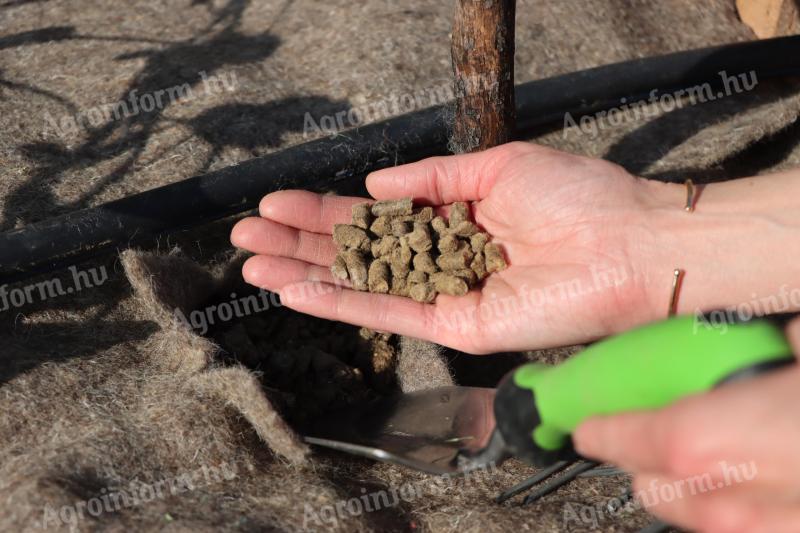Fitowool wool pellets in bags
 Pest county, 2300 Ráckeve
Pest county, 2300 Ráckeve
 1
1
| Price |
1.320 HUF |
| Manufacturer |
Agrologica Kft. |
| Product name |
Fitowool Gyapjú Pellet Általános felhasználásra |
| Approved for organic farming |
Yes |
| Composition |
100% gyapjú |
| Active ingredient |
9% nitrogén |
| Period of use |
15g/kg kén |
| Quantity unit |
Bag |
Description
Wool pellets are a completely natural concentrate of nutrients and organic matter. Its high nitrogen content is slowly released, ensuring a balanced supply of nutrients and more crops all season long. The nutrients and humus materials produced by the decomposition of the pellets create a healthy and well-structured soil. When mixed into the soil, it improves soil structure and water capacity by absorbing up to three times the amount of water, helping to retain soil moisture for plants during dry, droughty periods. It is an excellent additive to compost or other low nutrient mulches (e.g. straw, grass clippings). It is fertiliser and chemical free, weed free and helps to restore neutral pH to acidified soil. Also recommended for organic farming, vegetable gardens, raised beds, potted plants and fruit trees.
Spread the base dose of pellets in the planting hole, then spread the additional dose around the plants mid-season and lightly work it in! A heaped tablespoon is 15 g, a handful is about 40 g of wool pellets.
For nutrient replenishment:
- 70-140 g per planting hole when planting fruit trees, berries, ornamental trees, pines, shrubs, perennial ornamentals, 60 g/m² in spring and autumn for established plants, worked evenly into the soil and watered in,
- 150 g/m² when sowing or planting tomatoes, peppers, cabbages, cucumbers, pumpkins, melons, courgettes, parsnips, potatoes, 100 g/m² applied evenly to the soil and then watered in as a top dressing,
- 100 g/m² when sowing or planting root vegetables, leaf vegetables, herbs, 60 g/m² applied evenly to the soil as a complementary fertiliser and then watered in,
- 70 g/m² when sowing or planting radishes, beans, peas, onions, lettuce, 40 g/m² applied as a top dressing, worked evenly into the soil and then watered in,
- 20 g/litre potting soil or compost when growing seedlings,
- when planting balcony plants, potted plants and annual flowers, 20 g/litre potting compost, 10-50 g/litre potting compost for plants already planted, worked into the soil near the roots and then watered in.
Minimum order quantity: 100 kg.
Identifier: 7475179
Updated: 14 April 2025 at 08:45:00 CEST
















